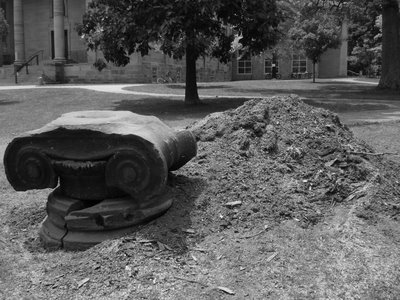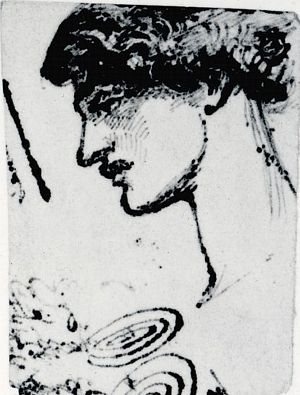A farewell and a reunion.

Tonight we had our second tornado warning of the week, which made for some exciting post-dinner, pre-dessert ping pong action in my excellent friends' basement. Unlike Monday's storm, this one actually passed right through Gambier, and though it seems not to have spawned tornadoes, it did pour forth some serious flooding in this area. Now, the stars are back out; my walk home from dinner took me through a world of earnest waterdropping from trees, ceilinged by pale summer stars.
During the afternoon, on my way to the library, I stopped yet again to visit the tree. Sometime between 9:30 p.m. yesterday and 2 p.m. today, the tree crew returned to take away or grind up the rest of the tree's remains. There's not much left. What you can see in this image is the capital from one of the columns on the original version of the building in the background; the building burned in the nineteenth century and was duly rebuilt. The capital has sat under our now-gone tree throughout my relationship with Kenyon. One of my favorite pictures of myself with my brother has us sitting back to back on that capital just after my baccalaureate, those many years ago.
When I talked to her about the tree this morning, my excellent friend suggested a third poem that I will now add to yesterday's group. This one is William Cowper's "Yardley Oak" (1791). The poem is too long to give you in full, but I'll offer a few segments. Alas, there seems to be no e-text of this one to which I can send you; you'll have to hunt down Cowper's poetry in volumes if you want more.
There's more, of course; you can see from the line numbers I've offered that there's much more, and the poem continues beyond this ending. But these are the bits of it that I like best, at least on first read, and that I think you might like picking through. This one is different from what I usually offer, of course; for one thing, it might be the oldest piece of poetry I've put before you. Find the lines whose sounds and ideas you like best.
Yardley Oak
Survivor sole, and hardly such, of all
That once lived here thy brethren, at my birth
(Since which I number threescore winters past)
A shatter'd vet'ran, hollow-trunk'd perhaps
As now, and with excoriate forks deform,
Relicts of Ages! Could a mind imbued
With truth from heav'n created thing adore,
I might with rev'rence kneel and worship Thee.
It seems Idolatry with some excuse
When our forefather Druids in their oaks
Imagin'd sanctity. (ll. 1-11)
.................................................................
Oh could'st thou speak
As in Dodona once thy kindred trees
Oracular, I would not curious ask
The Future, best unknown, but at thy mouth
Inquisitive, the less ambiguous Past.
By thee I might correct, erroneous oft,
The Clock of History, facts and events
Timing more punctual, unrecorded facts
Recov'ring, and mis-stated setting right.
Desp'rate attempt till Trees shall speak again! (ll. 40-49)
................................................................
Change is the diet on which all subsist
Created changeable, and Change at last
Destroys them. Skies uncertain, now the heat
Transmitting cloudless, and the solar beam
Now quenching in a boundless sea of clouds,
Calm and alternate storm, moisture and drought,
Invigorate by turns the springs of life
In all that live, plant, animal, and man,
And in conclusion mar them. Nature's threads,
Fine, passing thought, ev'n in her coarsest works,
Delight in agitation, yet sustain
The force that agitates not unimpaired,
But worn by frequent impulse, to the cause
Of their best tone their dissolution owe. (ll. 72-85)
...................................................................
So stands a Kingdom whose foundations yet
Fail not, in virtue and in wisdom lay'd,
Though all the superstructure by the tooth
Pulverized of venality, a shell
Stands now, and semblance only of itself.
Thine arms have left thee. Winds have rent them off
Long since, and rovers of the forest wild
With bow and shaft, have burnt them. Some have left
A splinter'd stump bleach'd to a snowy white,
And some memorial none where once they grew.
Yet Life still lingers in thee, and puts forth
Proof not contemptible of what she can
Even where Death predominates. The Spring
Thee finds not less alive to her sweet force
Than yonder upstarts of the neighbour wood
So much thy juniors, who their birth received
Half a millenium since the date of thine.
But since, although well-qualified by age
To teach, no spirit dwells in thee, seated here
On thy distorted root, with hearers none
Or prompter save the scene, I will perform
Myself, the oracle, and will discourse
In my own ear such matter as I may. (ll. 120-142)
-- William Cowper
At least there weren't small children frolicking in the sawdust and woodchips today.
And just yesterday evening, as I headed south to see the tree's stump, I rediscovered an old friend whose eulogy I had also been meditating. Whoever brings him back after he's been away for awhile must, I think, have some kind of link to my brain, in order to know just when I'm getting most fearful that he's gone for good.

Once again, tonight, I feel so exhausted that I could just drop, and so I think I will. A piece of breakfast pie (lemon meringue, a gift from a student who went home today, the summer session over) awaits me in the refrigerator. Such a thing is always good to know before bed.


0 Comments:
Post a Comment
<< Home